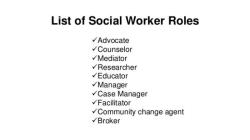What are the best practices for social workers?
Social workers play a critical role in supporting individuals, families, and communities in need. To provide effective support and services, social workers adhere to a set of best practices that encompass ethical principles, professional standards, and a commitment to promoting well-being. Here are some key best practices for social workers:
Ethical Conduct: Social workers adhere to a strong code of ethics, which includes principles such as respect for clients' autonomy, confidentiality, and a commitment to do no harm. Upholding ethical standards is foundational to the profession.
Cultural Competence: Social workers are culturally competent and sensitive to the diverse backgrounds, values, and beliefs of their clients. They seek to understand and respect cultural differences while providing services that are culturally responsive.
Empowerment: Social workers empower clients by helping them identify and use their strengths, resources, and capacities to address challenges and achieve their goals. They promote self-determination and client autonomy.
Client-Centered Approach: Social workers engage in client-centered practice, actively involving clients in the decision-making process and respecting their perspectives and preferences.
Assessment: Effective assessment is crucial. Social workers conduct thorough assessments to understand clients' needs, strengths, and challenges. They use evidence-based tools and gather relevant information to inform their interventions.
Collaboration: Social workers collaborate with other professionals, agencies, and stakeholders to provide comprehensive and coordinated services. Interdisciplinary teamwork is often essential in addressing complex social issues.
Advocacy: Social workers advocate for the rights and well-being of their clients. They may advocate at individual, community, or systemic levels to address social injustices and inequalities.
Professional Development: Social workers commit to lifelong learning and professional development. Staying updated on the latest research, interventions, and best practices ensures that they provide the highest quality of care.
Self-Care: Social workers recognize the importance of self-care to prevent burnout and maintain their own well-being. They take steps to manage stress, seek supervision when needed, and maintain a healthy work-life balance.
Confidentiality: Social workers adhere to strict confidentiality standards, ensuring that clients' personal information and disclosures are protected, except in situations where there is a duty to report for safety reasons.
Documentation: Accurate and thorough documentation of client interactions, assessments, and interventions is essential. Clear and organized records help in providing continuity of care and meeting legal and ethical requirements.
Trauma-Informed Care: Social workers are trained in trauma-informed care, recognizing the potential impact of trauma on clients' lives and ensuring that interventions are sensitive to trauma survivors' needs.
Crisis Intervention: Social workers are trained in crisis intervention techniques to provide immediate support and assistance to individuals and communities facing crises or emergencies.
Evaluation: Regularly evaluating the effectiveness of interventions and services is essential. Social workers use outcome measures and feedback from clients to assess progress and make necessary adjustments.
Legal and Ethical Decision-Making: Social workers confront ethical dilemmas and complex situations. They engage in a thoughtful process of ethical decision-making, seeking consultation and guidance when needed.
Boundaries: Social workers maintain appropriate professional boundaries with clients to ensure ethical practice and protect the client's well-being.
Resource Referral: Social workers connect clients to community resources, services, and supports that can help meet their needs, whether related to housing, healthcare, education, or employment.
Education and Prevention: Social workers engage in educational and preventive efforts to address social issues at various levels, including raising awareness and implementing preventive strategies.
These best practices reflect the ethical and professional standards that guide social work practice. They help social workers provide effective and compassionate support to individuals and communities, promoting social justice, empowerment, and positive change.
Social Work and Community Engagement: Examples of Impactful Social Activities
Social workers play a vital role in community engagement. They work with individuals, families, and groups to identify and address the needs of their communities. Social workers also work to build relationships between community members and to promote social justice and equity.
Here are some examples of impactful social activities that social workers can engage in:
- Organizing community events: Social workers can organize community events, such as health fairs, festivals, and educational workshops. These events can help to build community spirit, raise awareness of important issues, and provide essential services to community members.
- Advocating for public policy: Social workers can advocate for public policies that benefit their communities. For example, they may advocate for affordable housing, quality education, or access to healthcare.
- Collaborating with other organizations: Social workers can collaborate with other organizations in their communities to provide services and support to community members. For example, they may collaborate with food banks, homeless shelters, or youth development programs.
- Empowering community members: Social workers can empower community members to take action to improve their communities. For example, they may help community members to organize and advocate for their needs.
Making a Difference: Social Activities That Benefit Communities
There are many social activities that can benefit communities. These activities can help to build relationships between community members, improve the quality of life in the community, and promote social justice and equity.
Here are some examples of social activities that benefit communities:
- Volunteering: Volunteering is a great way to make a difference in your community. You can volunteer your time and skills to a variety of organizations, such as food banks, homeless shelters, or youth development programs.
- Donating to charity: Donating to charity is another way to support your community. You can donate money, goods, or your time to organizations that are working to make a difference.
- Participating in community events: Attending community events is a great way to show your support for local businesses and organizations. Community events can also be a fun way to meet new people and learn about your community.
- Getting involved in local government: Getting involved in local government is a great way to have a say in how your community is run. You can attend city council meetings, vote in local elections, or run for office yourself.
Building Stronger Communities: Social Work in Action
Social workers play a vital role in building stronger communities. They do this by working with individuals, families, and groups to identify and address the needs of their communities. Social workers also work to build relationships between community members and to promote social justice and equity.
Here are some examples of how social workers are building stronger communities:
- Working with youth: Social workers work with youth to help them develop the skills and knowledge they need to succeed in life. They also work to protect youth from harm and to ensure that they have access to the resources they need.
- Working with families: Social workers work with families to help them overcome challenges and to improve their quality of life. They may provide services such as counseling, parenting education, and support for families with special needs.
- Working with communities: Social workers work with communities to identify and address the needs of community members. They may also work to develop and implement programs and policies that benefit the community.
Social workers are committed to building stronger communities where everyone can thrive. They are changemakers who are working to create a better future for all people.











